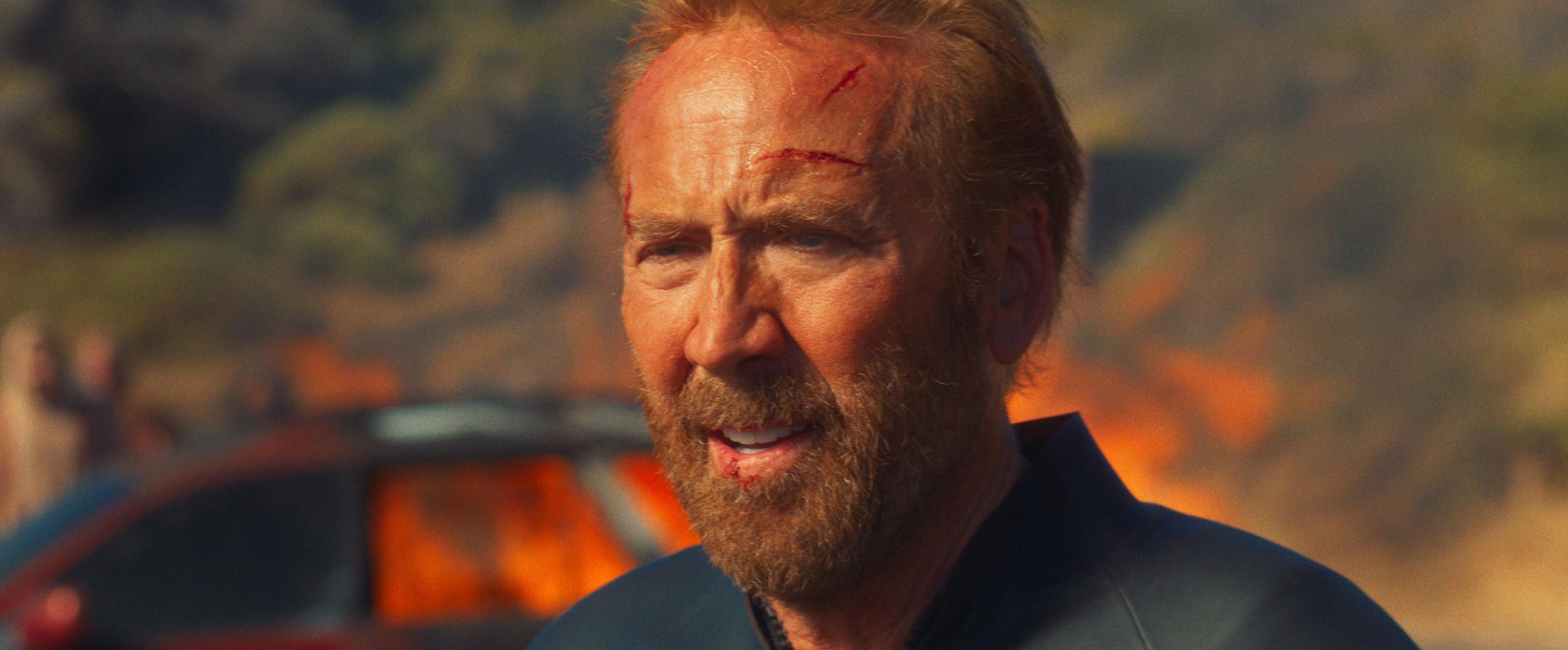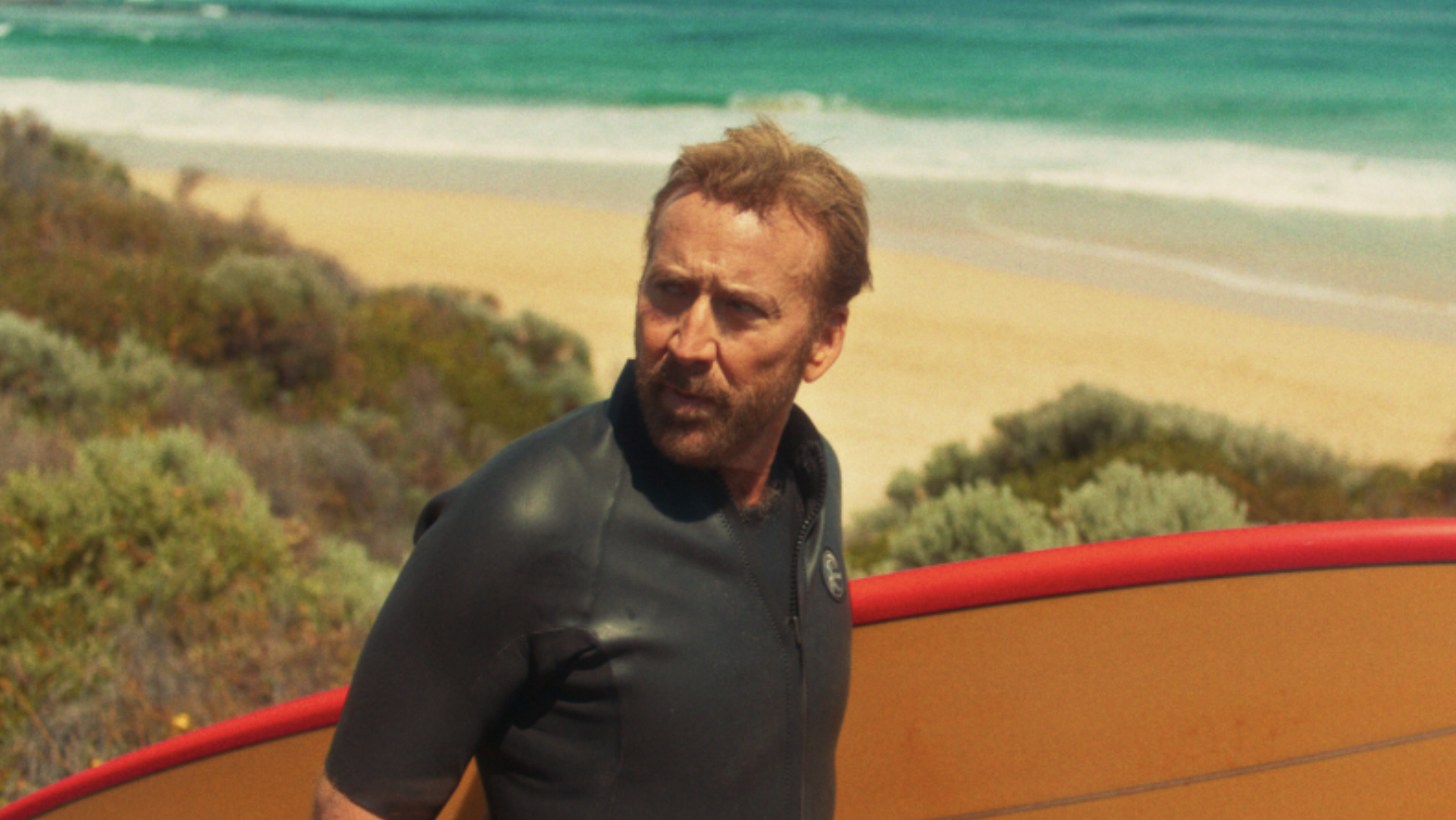‘The Surfer’ Review: Nicolas Cage Waxes Existential in a Sun-Scorched Odyssey of Ego, Depravity, and Psychosis
Curtsey of Roadside Attractions
Nicolas Cage pledges allegiance to the Fraternity of Surf and Suffering in a gloriously unhinged psychodrama about masculinity, memory, and midlife madness.
There are few actors working today who can simultaneously embody tragedy, absurdity, rage, and transcendence the way Nicolas Cage can. In The Surfer, director Lorcan Finnegan (Vivarium) gives Cage the ultimate stage to unravel all these contradictions in a raw, sun-bleached psychological freefall. Premiering at the 2024 Cannes Film Festival’s Midnight Section Last year and most Recently at SXSW, The Surfer feels less like a conventional narrative and more like a mythic fever dream—a descent into spiritual rot disguised as a beachside scuffle.
Set on the hyperreal shores of Australia’s Gold Coast, The Surfer follows Cage’s unnamed protagonist, a once-successful finance worker clawing at the ghosts of his past. He returns to Luna Bay with his estranged teenage son, dreaming of buying back the house where he spent his childhood. But when he’s publicly humiliated by a gang of aggressively territorial local surfers—who bar him from accessing the waves—a petty indignity blooms into a full-blown metaphysical war.
Finnegan and screenwriter Thomas Martin deftly strip away narrative conventions to expose a rotting psyche baked under relentless sunlight. Like Wake in Fright filtered through Big Wednesday and Eraserhead, the film weaponizes Cage’s natural volatility, twisting a simple story of a man trying to reclaim his beach into a cosmic battle for dignity, home, and sanity.
What sets The Surfer apart is its refusal to offer a clear boundary between reality and hallucination. As Cage’s character spirals downward, so too does the film’s grasp on linear storytelling. Scenes repeat with slight, uncanny differences. Characters deliver lines with eerie affectlessness, as if mocking his pain. Time itself seems to melt under the pitiless sun. Is he trapped in a cruel purgatory of his own making? Or is the universe, in all its indifference, simply laughing?
Curtsey of Roadside Attractions
From the outset, there’s an aching fragility to Cage’s portrayal. His character’s delusion—that real estate and nostalgia can heal psychic wounds—makes him instantly sympathetic and tragic. But as the tide of humiliation rises—his car is stolen, his surfboard mocked, his dignity shredded—we watch him fracture, mutate, and finally transcend into something mythic. Cage’s performance is both hilariously exaggerated and heartbreakingly vulnerable. One moment he’s delivering absurd Nietzschean monologues about suffering and salvation; the next, he’s scuttling barefoot across the dunes, clutching a dead rat as a weapon.
The film’s visual language reinforces this psychological disintegration. Cinematographer Radek Ladczuk (The Babadook) frames the sunburnt coast with an oppressive brightness that feels increasingly hostile, even unnatural. Distorted close-ups, dizzying drone shots, and strange cutaways to desert reptiles turn the beach into a psychological arena where nothing is fixed and everything conspires against our tragic antihero.
The thematic undercurrents run deep. On one level, The Surfer is a merciless satire of late-stage masculinity: the absurd rituals of dominance, the toxic dream of “taking back” one’s perceived rightful place, the desperate clinging to symbols of status and control. Cage’s protagonist seeks redemption not through growth but regression—believing that if he can just possess his childhood home again, he can undo the unbearable complexities of adulthood. It’s a quest doomed not just by external forces but by his own inability to accept change, loss, and mortality.
As Cage’s character spirals downward, so too does the film’s grasp on linear storytelling. Scenes repeat with slight, uncanny differences. Characters deliver lines with eerie affectlessness, as if mocking his pain. Time itself seems to melt under the pitiless sun. Is he trapped in a cruel purgatory of his own making? Or is the universe, in all its indifference, simply laughing?
Curtsey of Roadside Attractions
Cage’s performance is, simply put, extraordinary. Beneath the stooped posture and hollow grin of a man clinging to a broken American Dream, he channels a river of bottomless yearning. His initial fragility is deeply human, rooted in a deluded but understandable hope that reclaiming lost spaces could somehow heal psychic wounds. Yet as the sun bears down and the humiliations mount—his surfboard stolen, his belongings trashed, his very identity questioned—Cage mutates into something both feral and mythic. It’s a performance pitched between Shakespearean tragedy and slapstick grotesquerie, at once hilarious, horrifying, and uncomfortably intimate.
Radek Ladczuk’s (The Babadook) cinematography transforms the Gold Coast into a hallucinatory nightmare. The sun doesn’t simply shine here; it punishes. Every surface seems to pulse with malevolent heat. Drone shots dizzyingly tilt and spin over the indifferent ocean. Interiors blur and shift like half-remembered dreams. Each frame mirrors Cage’s psychological deterioration, making The Surfer a rare film where environment and character collapse together into shared delirium.
Crucially, The Surfer is more than just a study of individual breakdown. It offers a searing indictment of wounded masculinity—particularly the entitled, nostalgic masculinity that clings to territory, conquest, and lost youth. The local surfers, led by the chillingly banal Scally (Julian McMahon), aren’t just random beach bullies; they’re a metaphor for modern tribalism, a privileged caste fiercely guarding access to fading paradise. Cage’s fight isn’t simply against a gang of thugs, but against the invisible social contracts that say you must earn your place, suffer for your pleasures, and ultimately accept your own obsolescence.
Curtsey of Roadside Attractions
Throughout, Finnegan refuses to offer easy catharsis. There’s no righteous revenge here, no sudden redemption. Instead, the film sinks deeper into absurdism, layering its psychodrama with flashes of savage black comedy and grim existential terror. At times it feels as though we’re watching a surf noir scripted by Werner Herzog and shot by David Lynch: surreal, merciless, yet weirdly tender.
Sound design amplifies the unease. Distant music warps into guttural growls. The crash of waves distorts into dissonant echoes. Snatches of mockery and laughter seem to drift from nowhere and everywhere. Even Cage’s muttered soliloquies—half-beach-bum philosophy, half-biblical lament—reverberate in the oppressive, salt-choked air like transmissions from a dying star. Waves crash not soothingly but menacingly. Distant party music warps into dissonant cacophony. Cage’s feverish mutterings echo in cavernous beach bathrooms. Every element conspires to fracture his mind—and ours.
For all its trippiness, The Surfer remains laser-focused on its central wound: the agony of realizing that the past cannot be reclaimed, only mourned. Cage’s desperate quest to buy back his childhood home is a delusion fueled by fear, nostalgia, and the fantasy of eternal return. The real Luna Bay, like the real world, has moved on. The ocean does not remember the smallness of human dreams. The surf belongs to those willing to suffer for it, or perhaps to no one at all.
Curtsey of Roadside Attractions
The film’s climax, an extraordinary sequence where Cage stumbles bloodied and barefoot into a ritualistic surf initiation, is both brutal and strangely beautiful. His final act—paddling into the breakers not for victory, but for the right to exist—is less a triumph than a tragic form of grace. It’s a reminder that dignity can sometimes be found only in surrender, not conquest.
Finnegan also frames the conflict against a sharply critical portrait of neo-colonial entitlement. Luna Bay’s self-appointed “surf lords” represent a new aristocracy: trust-fund beach bums weaponizing “localism” to guard their privilege. Cage’s every attempt to appeal to justice or community is met with blank contempt. It’s a world ruled by brutal tribalism where respect can only be earned through suffering—a brutal inversion of the carefree surf culture myth.
POPULAR ON THE CINEMA GROUP
And yet, for all its bleakness, The Surfer surges with a strange, desperate kind of hope. Beneath the humiliation, the absurdist horror, and the endless suffering, there’s an elemental dignity in Cage’s refusal to surrender. If the world demands that he surf only through agony, then surf he will. When he finally rises on a battered, borrowed board in the final frames—bloodied, broken, but unbowed—the film achieves a transcendent catharsis as unlikely as it is unforgettable.
Curtsey of Roadside Attractions
The Surfer is not a film for everyone. It’s messy, abrasive, often deliberately alienating. But for those willing to paddle out past the breakers of traditional genre fare, it’s a cinematic riptide worth surrendering to—a gnarled, glorious parable of identity, grief, and the impossible dream of paddling back to shore.
You don’t simply watch The Surfer.
You are swallowed by it,
thrashed by it,
spit out by it.
And if you’re lucky, you come up gasping—not victorious, but changed.














